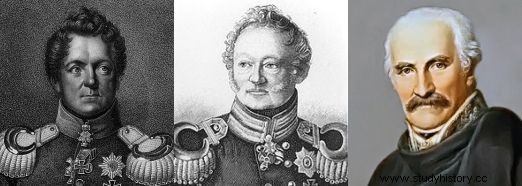The death of Napoleon arouses unflagging controversy. Many still believe the rumor that the British contributed to the premature death of the French Emperor by systematically poisoning him with arsenic. Maybe it was so, but at the same time it was the Englishman, the famous Duke of Wellington who saved Napoleon's life in 1815. If not for him, the deposed emperor would not have to worry about his stay on the island of St. Helen ...
You are probably wondering how it is possible that Napoleon owed his life to his conqueror at Waterloo? The answer is very simple:had it not been for the staunch objection of the British marshal, the Prussians in 1815 would have placed the "Little Corporal" in front of the firing squad without the slightest dilemma!
This is clearly evidenced by the correspondence between two high-ranking Prussian military personnel:General August N. von Gneisenau and Major General Karl F. von Müffling, who served as a liaison officer in Wellington's staff.

Napoleon did not even realize how close he was to say goodbye to this world as early as 1815.
In one of the letters - dated June 27, 1815 and quoted in Andrew Roberts' book, Napoleon and Wellington. A long duel "- Count von Gneisenau presented the opinion of his superior, Marshal von Blücher:
Bonaparte was declared an outlaw by the Allied Powers. [...] Your Excellency will lead the negotiations in such a direction that Bonaparte will be handed over to us and executed in the future. This is what eternal justice and the March 13 declaration demand; and so is the blood of our soldiers […] will be avenged.
The declaration mentioned by the Prussian general was signed during the Congress of Vienna on March 13, 1815, after the news of the Emperor's escape from Elba reached the delegates of superpowers gathered there. Importantly, Wellington was also one of its signatories. The document stated, inter alia, that:
[…] The Powers declare that Napoleon Bonaparte is outside the norms of civil and legal relations and that, as an enemy and enemy of world peace, he has placed himself in the hands of la vindicte publique.

Gneisenau, Müffling and Blücher. All three dreamed of putting Napoleon in front of a firing squad.
So, as we can see, the Prussians intended to take very literally what was established in the capital of the Austrian Empire by angry generals and diplomats. Here, however, there is a "little" problem. It turned out that the famous conqueror of Napoleon from Waterloo did not intend to put a hand to the killing of the Corsican. Von Müffling (and not only him) explained that he considered this interpretation of the declaration to be completely wrong, because:

never had [she] urged Napoleon to be murdered. […] Such an act would tell history our names in crime, and posterity would tell us that we were not worthy of being Napoleon's conquerors; the more that such an act is completely pointless and has no purpose.
As you can easily guess, the above answer did not make Marshal von Blücher and Count von Gneisenau very happy. Andrew Roberts notes in his work:
The latter, an Anglophobe by conviction, later complained of Wellington's "theatrical benevolence" in saving Napoleon's life, and even stated that the prince's humane behavior was only a cover for his desires for subsistence alive of the man whose career prolonged Britain's "greatness, prosperity and wealth" so much.
The Prussians, despite the British disagreement with the execution, remained intransigent, demanding at least the transfer of the French emperor into their hands . However, the islanders had no intention of agreeing to that either. They had their own plans for him, which we know eventually led to Napoleon's settling on the rocky St. Helena.
Source:
Trivia is the essence of our website. Short materials devoted to interesting anecdotes, surprising details from the past, strange news from the old press. Reading that will take you no more than 3 minutes, based on single sources. This particular material is based on:
- Andrew Roberts, Napoleon and Wellington. A long duel , Replica 2011
